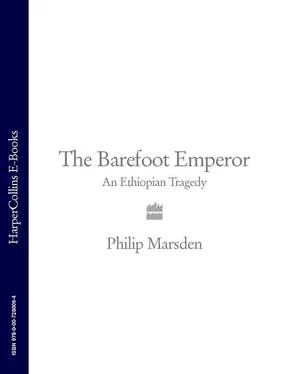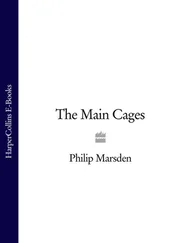Few images survive of Tewodros and many of those that do are fanciful. The one that is pinned to my wall as I write this comes from the frontispiece of Hormuzd Rassam’s two-volume Narrative of the British Mission to Theodore, King of Abyssinia (1869). Said to have been a fair likeness, the lithograph shows him on a high rock on the edge of the Blue Nile. He is dressed simply, in cotton shamma and loose cotton trousers. His feet are bare. Gripped in his right hand is a slender seven-foot spear; his left wrist rests on the stock of one of two pistols thrust into his belt. He is looking to one side, at a group of his followers struggling to follow him up the slope. In his stance and expression is a tense ambiguity, between impatience and concern, compassion and anger.
In Addis Ababa, just before I returned in 2003, the cult of Tewodros had found physical expression on one of the most prominent roundabouts in the city. Squatting on a high stony plinth, on the back of a vast wooden wagon, was a reproduction of Sevastopol. The installation had been encouraged by the country’s president, Girma Welde Giyorgis – a fan of Tewodros – and instigated by the mayor of Addis Ababa and Professor Richard Pankhurst. I’d known Richard for over twenty years, and when I went to see him and his wife Rita in their leafy villa, he told me the story in his own dry and ironic way. But he too recognised Tewodros’s stature.
‘We flew up in an old Soviet helicopter, landed on Meqdela. We were back in Addis by teatime.’ They took measurements of the gun where it lay. On the roundabout halfway down Churchill Avenue, looking at the dimensions and the traffic island, Richard began to have doubts. In Tewodros’s day, on its wagon, Sevastopol may have been an impressive sight, but now, on a busy interchange, dwarfed by Isuzu trucks and Toyota Land Cruisers, the seven-ton mortar would look tiny.
‘What did you have in mind?’ the mayor asked Richard.
‘Something bigger, about the size of a Volkswagen.’
So the mayor brought a small crane and they hoisted a V W Beetle on the back of a minibus, and they all agreed that that was much more like it. They multiplied the measurements and commissioned a metal-worker to forge it. A ramp was built, and the gun placed at the sort of angle at which it had rolled up to Zebit, or from the Jidda and Beshilo rivers, or for the final ascent of Meqdela itself.
The metal-worker also made a smaller model. Richard reached out and took it down from his mantelpiece. He handed it to me. I held it in my palm, a mini-Sevastopol to match the exaggerated one on Churchill Avenue. I marvelled once again at Tewodros’s gargantuan will, and at the strange distortions of scale that he had undergone since his death.
In 1863, Emperor Tewodros wrote in a letter to the French vice-consul: ‘Having heard reports from the time I was born until I reached maturity, being told over and over again that, by the power of God, there are in Europe, in the countries of the Europeans, those whose governments do not fall, who lack nothing in terms of law and order, in whom there is no deceit, by the power of God, I was very happy.’
From the start, contacts between Ethiopia and Europe were characterised by impossible expectations. Europeans came to the country with their own lofty ideas. They thought the emperor was an all-conquering Christian potentate (Prester John and his seventy vassal kings), or they wanted to locate the source of the Nile (a certain bog to the south of Lake Tana), or they came to hunt wild beasts, collect exotic flowers or correct the religious delusions of the country’s Christians. The Ethiopian emperors had their own hopes of the visitors. They wanted Christian solidarity, support in their wars, and technology – in short, they wanted guns.
The very first official visit from Europe set the pattern. One night in 1520 a small band of Portuguese arrived at the hedge outside the camp of Emperor Lebne Dengel with a letter of friendship for ‘Prester John’. The emperor refused to admit them. In frustration, a couple of the Portuguese raised their guns to the stars, and fired.
At once a messenger appeared: ‘His Majesty asks, how many guns do you have for him?’
‘We have three or four muskets and those for our own use.’
The emperor still refused to see them.
A few years earlier, the Ottoman Turks, under Sultan Selim the Grim, had conquered Egypt, received the keys of Mecca and with money and weapons spread their influence on down the Red Sea. They encouraged the emirates of the coast to annex Christian Ethiopia. Having no port, the Ethiopians found it hard to obtain arms to defend themselves. Now these Christian foreigners had come to see the emperor, and all they brought him was a useless letter.
In the end, Lebne Dengel did consent to see them and at once asked them ‘Do the Turks have good bombards?’
‘As good as ours,’ replied the ambassador. ‘We are not afraid of the Turks. We are valiant in the name of Jesus Christ.’
‘Who taught the Turks to make bombards?’
‘The Turks are men. They have skills and knowledge.’
And so it went on. The Portuguese ambassador wanted only to read out his letter from King Manuel I, and return home. But now he had admitted them, the emperor wouldn’t let them go (thereby establishing another pattern of the Ethiopian court – the detention of foreign visitors).
‘You have only just arrived,’ the emperor said. ‘You have seen only a fraction of my kingdom. Play your spinet for me. Dance .’ The ambassador danced.
A few days later Lebne Dengel asked for a musket demonstration. There were more requests, and as the days became weeks, the Portuguese grew uneasy. In the end it was six years before they were allowed to return to the coast. During that time the emperor gained from them just two swivel guns.
Three decades later in, 1557, the Turks finally occupied Massawa. Their plans to add Ethiopia to the Ottoman Empire were checked less by military means than by the Christians’ own natural defence, the highlands. For the next three hundred years, until the time of Tewodros, the Red Sea port of Massawa – Ethiopia’s gateway to the outside world – was governed by Muslims.
Meanwhile Spanish and Portuguese Jesuits had remained in Ethiopia, and early in the seventeenth century managed to persuade Emperor Susenyos to abandon fifteen hundred years of religious teaching, forsake the Christology of Alexandria and come over to Rome. Susenyos had underestimated the convictions of his subjects. The country collapsed into civil war. ‘How long,’ cried his people, ‘shall we thrust our swords into our own bowels?’ Susenyos abdicated and the Jesuits were expelled. There was great rejoicing: ‘At length the sheep of Ethiopia freed from the bad lions of the West!’ Disgust for Europeans was so intense that it drove the Ethiopians to arrange a treaty with the hated Muslims of Massawa: they agreed to prevent any European Christians from reaching the highlands. When the Ethiopian emperor received from the coast the stuffed heads of some French and Italian Capuchins, he knew he had found a reliable ally. Secure from both Turks and proselytising Christians, the Ethiopians remained isolated in the fortress of their mountains, free to pursue their own internal squabbles.
In 1798, Napoleon’s occupation of Egypt brought a new era of European power to the Middle East and introduced to Egypt the restless spirit of the Enlightenment. Twenty years later the Egyptian ruler, Muhammad Ali, pushed southwards down the Nile. For decades, pressing at the lowlands around Ethiopia, Egyptian forces made periodic forays into the mountains. Conquest by Egypt was the most persistent outside threat to Ethiopia during the nineteenth century.
Читать дальше












